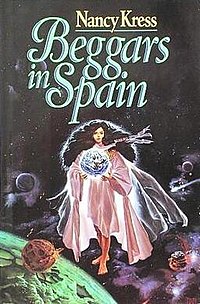
Nancy Kress's novel Beggars in Spain is a fascinating work of speculative fiction. In this novel, Kress explores the idea of creating a genetic modification that allows humans to lack the need for sleep. These Sleepless children grow from babies who, in the absence of night nurses and tutors, cry all night long from boredom, into adolescents and adults. Humanity discovers the many advantages the Sleepless have -- virtually no decay at the basic cellular level, few signs of aging, centuries of life -- and becomes fearful of and hostile toward this small group of individuals. Discrimination and hatred grow until finally, all but two of the Sleepless in the world escape to a space station they call Sanctuary.
I've read this story several times now, and this time I was really disappointed by the lack of any real spirituality. Imagine what you would see from someone like Teresa of Ávila or Thomas Aquinas or Hildegard of Bingen or even the ecstatic Persian poet Hafez, if they had all those nighttime hours available to them!
Instead, most of the Sleepless live by a doctrine espoused by the fictional creator of unlimited cheap energy, Kenzo Yagai. Yagaiism is based on individual achievement, with the basic unit of relationship being the contract. The question is posed several times in the novel, what do we owe to those who can give nothing in return? What do we owe to those who not only have nothing to give in return, but would kill us and seize all that we have anyway? When this question is posed to the main character, Leisha Camden, it is worded What do we owe to the beggars in Spain? This question comes up several times in the novel as a thread that runs through the story; Leisha struggles with this question, because it does not fit into the Yagaiist framework through which she views the world. The Sleepless on their fortified space station of Sanctuary answer emphatically: absolutely nothing.
Of course, as Christians, we know what we owe to the beggars in Spain, because Jesus tells us. We owe them everything. The gospels tell us the very basics, which have become the Corporal Works of Mercy in the Catholic tradition: feed the hungry, give drink to the thirsty, clothe the naked, shelter the homeless, take care of the sick, visit those in prison. Even if those beggars would knock us down and steal our clothes and money, even if they would invade our home and eat our food, even if they were lying sick on our doorstep, even if tossed into jail for crimes like sleeping on a park bench -- even then, it's our job to take care of them. Eventually, Leisha finds this answer; naturally, it is the work of a lifetime... or more.
Kress has written two more novels that follow this one: Beggars and Choosers and Beggars Ride. I have not read these yet, but now I'm curious.



No comments:
Post a Comment